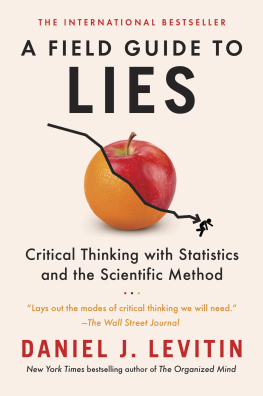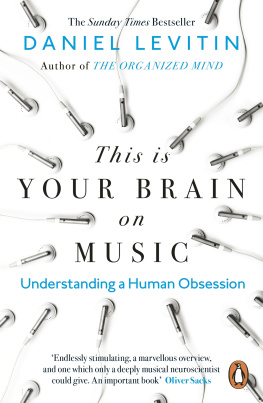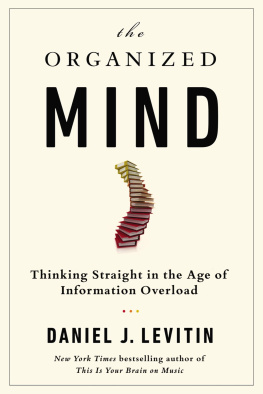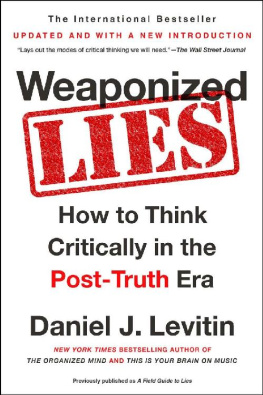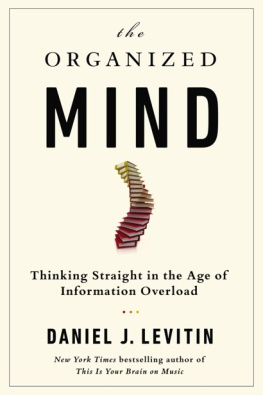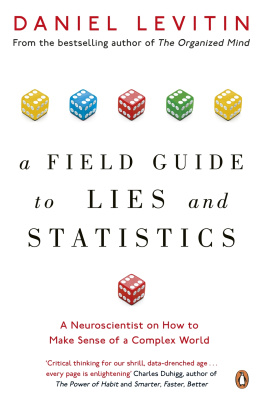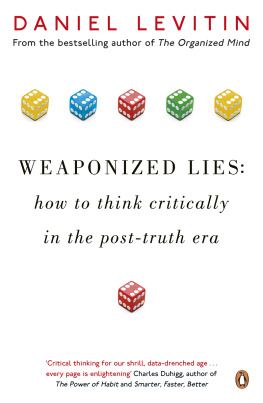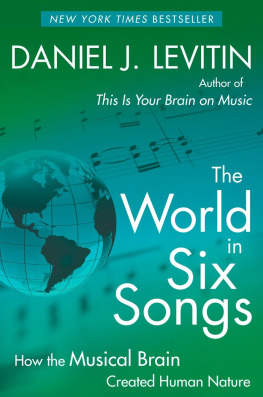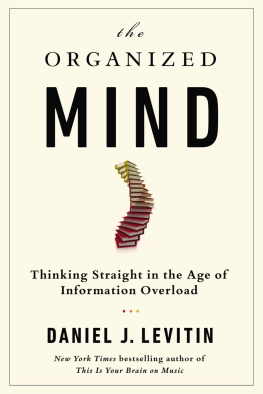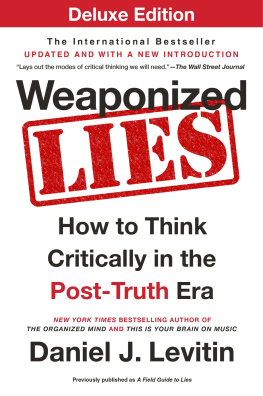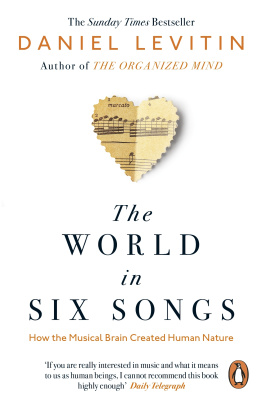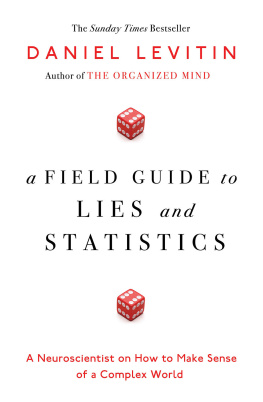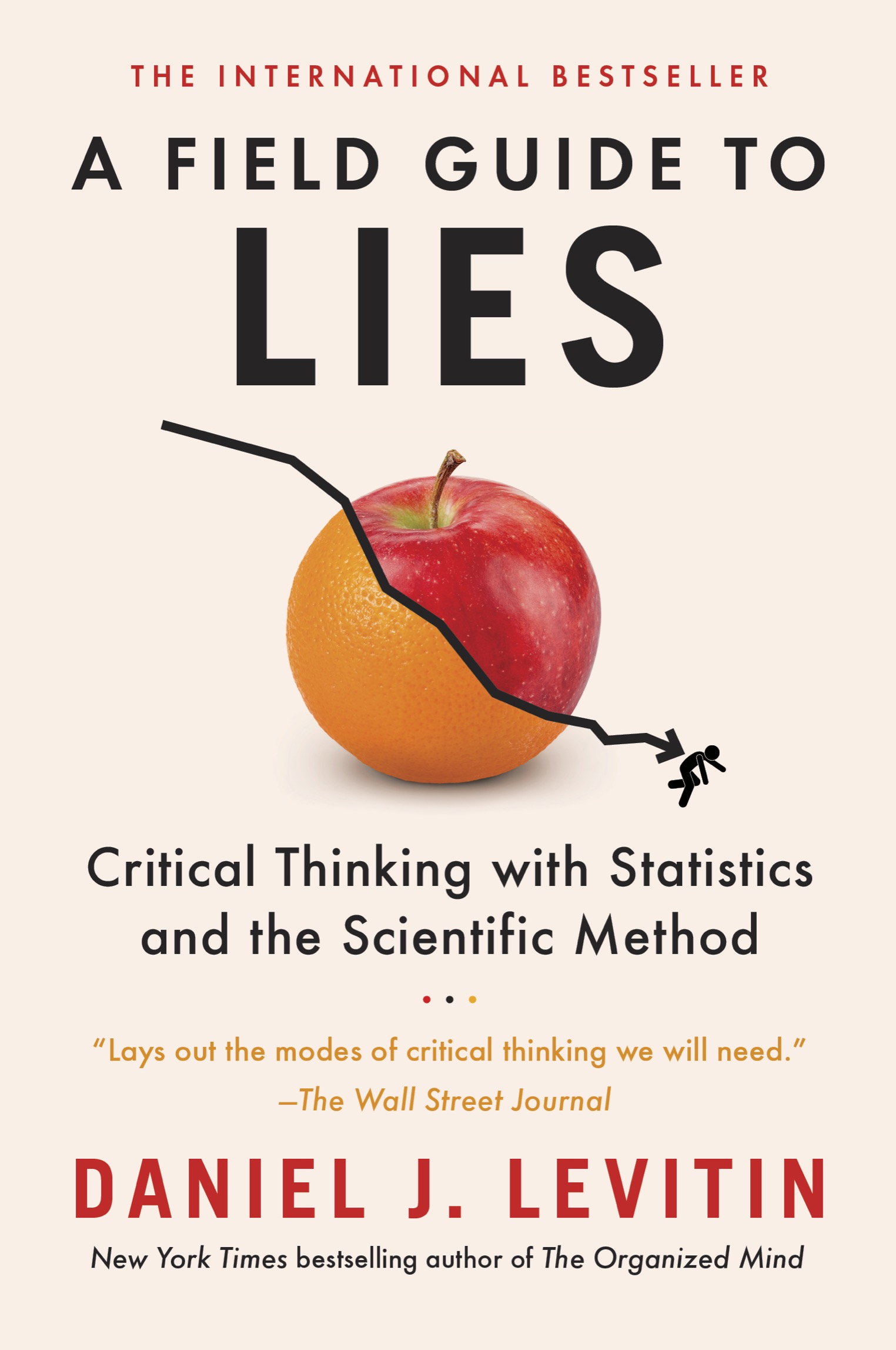Praise for A Field Guide to Lies
The world is awash with data, but not always with accurate information. [Levitins book] does a terrific job of illustrating the difference between the two with precisionand delightful good humor.
Charles Wheelan, senior lecturer and policy fellow, Rockefeller Center, Dartmouth College; author of Naked Economics
Neuroscientist Daniel Levitin lays out the many ways in which each of us can be fooled and misled by numbers and logic, as well as the modes of critical thinking we will need to overcome this.
The Wall Street Journal
Valuable tools for anyone willing to evaluate claims and get to the truth of the matter.
Kirkus Reviews
This useful, entertaining, and highly readable guide is ready to arm everyday citizens with the tools to combat the spread of spurious, and often ridiculous, information.
Library Journal
A book you may want to have close by at all times.
Success Magazine
Smart and humorous.... The tools anyone needs to tell good information from bad are in this definitive guide to critical thinking.
Shelf Awareness
Exceptional.... Practical and essential advice.
Big Think
An entertaining, user-friendly primer on evaluating data wisely.
Washington Independent Review of Books
This is a wonderful book. It covers so many of the insights of science, logic, and statistics that the public needs to know, yet are sadly neglected in the education that most of us receive.
Edward K. Cheng, Tarkington Chair of Teaching Excellence, professor of law, Vanderbilt University Law School
Hits on the most important issues around statistical literacy and uses good examples to illustrate its points. I could not put this book down. Reading it has been a pleasure, believe me. I am so impressed with Levitins writing style, which is clear and simple, unlike much of the murky stuff that is written by statisticians and many others.
Morris Olitsky, former vice president, Market Research and Analysis, Prudential Financial; statistician, USDA
Insightful and entertainingan excellent work.
Gregg Gascon, Biomedical Informatics, the Ohio State University
Just as Strunk and White taught us how to communicate better, [this book] is an indispensable guide to thinking better. As Big Data becomes a dominant theme in our culture, we are all obliged to sharpen our critical thinking so as to thwart the forces of obfuscation. Levitin has done a great service here.
Jasper Rine, professor of Genetics, Genomics, and Development, UC Berkeley
Not since Huffs classic How to Lie with Statistics has a book so clearly described how numbers can be used to deceive and misdirect. Levitin shows how to critically evaluate claims that charlatans, the media, and politicians would have us believe.
Stan Lazic, team leader in Quantitative Biology, AstraZeneca
A must-read! Professor Levitin convinces the reader why critical thinking has become even more crucial in the information age. As we are consistently bombarded with information, lets question its veracity and acquire the tools to analyze it.
Isabelle Bajeux-Besnainou, dean and professor of finance, Desautels Faculty of Management, McGill University
A valuable primer on critical thinking that convincingly illustrates the prevalence of misinformation in everyday life.
Publishers Weekly
[Levitins] finger is on the pulse of the zeitgeist.... A very helpful guide to the way that news organizations can misuse information, from statistics to maps to graphs.
Seattle Review of Books
Levitin talks about the crucial role of critical thinking and seeking out the truth in todays media landscape.
NPRs Forum/Michael Krasny
A guide for those who wish to test the authenticity of information that inundates us from every corner, dark and light, of the Web.
The Washington Post
Misinformation is a curse of the information age, and Levitin offers blow-by-blow demonstrations of how words, numbers, and graphics can be manipulated to distort truth.
Stanford Magazine
Misinformation is a part of everyday life in our data-intense, internet-enhanced world. Levitin provides an entertaining and engaging guide to how we can use critical thinking to avoid being fooled.... a valuable survival guide to consuming information in the digital age.
Lori Holt, professor in the Department of Psychology and the Center for the Neural Basis of Cognition at Carnegie Mellon University
Levitin has written an important book for our times. Everyone should read itdemocracy depends on it.
Vicente Fox, 55th president of Mexico
Levitin is brilliant. Everyone should read A Field Guide to Lies.
Chris Matthews
Eloquent.
The Los Angeles Review of Books
Mr. Levitin is the perfect guide.... If everyone could adopt the level of healthy statistical skepticism that Mr. Levitin would like, political debate would be in much better shape.
The Economist
Who knew that a book about statistics could be so riveting!
Dallas Public Library
Confirmation bias is a growing problem in the digital information age. As Daniel Levitin writes, our brain is a giant pattern detector. If we read something that coincides with what we already believe were more likely to give it credence, while the opposite is not true.... The good thing about science is that its true whether or not you believe in it.
John Cleese
Our brain is wired to make snap judgments. And those judgments can be very, very wrong. A Field Guide to Lies... teaches how to separate fact from fringe theories and fake news.
NPRs Marketplace
In a post-truth world, [this] is an invaluable primer on how to sort the fact from the fiction.
The Sunday Times, London
A practical guide to better managing todays constant flow of data and to improving critical thinking... A recommended book for creative leaders.
Forbes
On the internet, nobody knows youre not an expert. Luckily, McGill University cognitive psychologist and A Field Guide to Lies author Daniel J. Levitin has a few tricks to pick out the professors from the phonies.
Business Insider
A plea for sanity in a world seemingly gone mad... Levitin is an eloquent and enthusiastic exponent.
The Los Angeles Review of Books
A lucid guide to critical thinking about statistics, information, and assertion, its profoundly welcome.
The Guardian
A timely primer on how statistics, polls, and information presented as facts can be used by lying weasels to obscure the truth. Addresses the careless or lazy critical thinking skills many have developed in the era of internet information overload.
TheForward
Instead of merely pointing out problems, Levitin offers solutions.... He explores the ways that researchers and companies manipulate statistics, teaching us how to properly read studies without the intended bias.
Big Think
A necessary book and one most appropriate to the times we find ourselves in... [An] excursion through how to think about data, how to think about statistics, and how to do so in a systematic way.
The Times Higher Education
The timing could not be better.... A survival manual for the post-factual era. Levitin offers a set of intellectual tools to help distinguish the real from the unreal, and often surreal.
Literary Review of Canada
Much like Nate Silvers (New York Times

